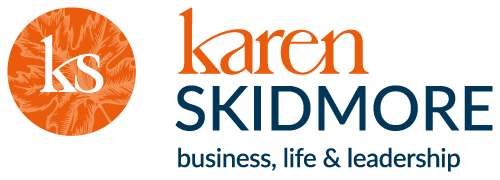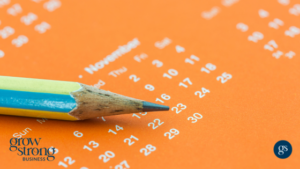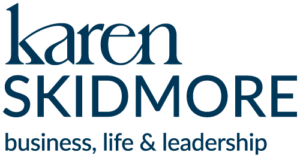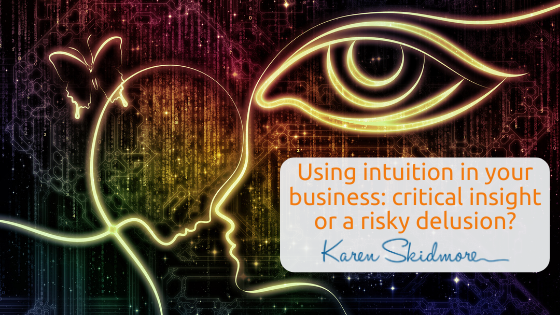
by Karen Skidmore | 02,21 | Business Planning, Stories, inspirations & thoughts for the day
You know far more than you give yourself credit for.
However, trusting yourself to know this and using your intuition to help you grow a business is not a natural way for many of us.
If you are like a lot of people who I work with, you have spent much of your professional career thinking your way through challenges and problems. Your default setting has been to seek answers externally (AKA ask other people what they think) and engage your frontal lobe, the part of your brain behind your forehead where you access to process information, analyse, think and plan.
You probably already use phrases such as ‘I knew in my gut that it was the right thing to do’ or ‘I felt the tug on my heart strings’. But using these insights in a business context often get swept away and ignored.
In doing some digging around for some quotes on intuition, I came across this article from Harvard Business Review from way back in 2003.
“The trust in intuition is understandable. People have always sought to put their faith in mystical forces when confronted with earthly confusion. But it’s also dangerous. Intuition has its place in decision making – you should not ignore your instincts any more than you should ignore your conscience – but anyone who thinks that intuition is a substitute for reason is indulging in a risky delusion.”
I’d like to think that using our intuition in business has come a long way since this article was first published, but if you are a Gen X like me, it’s hard to get away from the cultural programming we’ve had.
We have grown up in a culture that favours logic; at school we were programmed into learning, sitting in rows and changing lessons each time the school bell rang, followed by working our up a hierarchical career path that celebrated success measured by numbers and time.
Today, we have access to an endless supply of productivity apps, automation systems and bluetooth devices all designed to send us constant notifications and help us do more in less time. Our smartphones can tell us how well we are eating, sleeping and exercising, which means we don’t have to think for ourselves.
And when it comes to our business and marketing, we look to the algorithms to make decisions on when to launch a new programme or what content to create.
But first, why is your intuition so important to access?
If you allow yourself the space to connect and access your inner wisdom, you often find far simpler and easier answers to your challenges and problems. There’s no need to spend days analysing spreadsheets or writing up lengthy reports.
The answer often comes through as a clear path forward; it just feels right.
The official definition of intuition is:
“the ability to understand something instinctively, without the need for conscious reasoning.”
And if we go back in time to see the origins of the word in mid-15c:
intuicioun, “insight, direct or immediate cognition, spiritual perception,”
“Hang on … instinct? spiritual? Are you going down the woo-woo route and telling me that all we need is to simply burn incense sticks and spend our time meditating on problems?”
No. Spend too much of your time going within, and there’s no doubt you can find yourself ‘away with the fairies’. Very little action happens and if you then find it hard articulate or communicate your business direction with your team or customers, it all becomes very ethereal.
Logic still has a place and can helpfully sanity check ideas, bring concepts to form and create the structure, process and systems to allow you to run your business with ease. But without giving yourself the opportunity to open yourself up to feeling, listening and sensing what your instinct can tell you, you are missing out on some of the simplest and easiest options available to you and your business.
Your intuition will always have your back. It’s giving you feedback and insight into what is right for you, the person you are and what it is you truly want out of life.
So how to go about learning how to access your intuition?
For me, I have had a crazy relationship with my logic head.
I am naturally wired to be ruled by my head, which serves me well when working with clients and working through business infrastructure and systems quickly, and seeing the commercial opportunities linked with a bigger vision. However, when left unchecked, I can power on through and forget to take breaks to conserve my energy.
I crashed and burned when I was in my early 40’s, so I have learnt the hard way. When this happened, I realised I had lost all my connection with myself from the neck down. Burn out can do that to you! I remember being a class teaching pelvic floor exercise and sobbing silently into my yoga mat when I realised I could not engage any muscles in my pelvis area; there were no connections between my brain and core muscles. So was it any surprise that my intuition had very little chance of being heard?
A big part of my recovery journey, and understanding my midlife hormonal changes and menopause shifts, became looking at how to connect with my body. I stopped running and started dance classes instead. Nia Dance has become a regular part of my fitness routine now, connecting me to my hips and allowing me to literally shake away tension in my body.
I tried my hand at meditating but to be honest, it’s not a practice that I find much time for. I know that goes against the trends but I prefer a slow walk through the trees and spending my time watching the sun set, rather than sitting still, trying to calm my mind.
I’ve come to realise that, although every one of us has the ability to connect with our intuition, I have had to work at how to do this. And I know from speaking to many other business owners over the years, that I am not alone.
So here are my four simple steps that got me started.
1) Take the time to know yourself.
There are a tonne of psychometric tests and personality profiles available, often affordable and without the need to attend lengthy programmes. My favourite ones include MBTI Basics, Insights, Talent Dynamics (and also called Wealth Dynamics) and Human Design. Profiling oneself is not about trying to fit in.
Each one of us is unique and we don’t arrive on this planet with an operations manual. So the more we can understand our idiosyncratic quirks and behaviour traits, the less it becomes about what others expect of us and more about what it is that we want and value.
2) Spend more time in your body.
Many of you will exercise for the sake of fitness and health, measuring success by steps or sweat. But because so much business is often solved in our heads, these kinds of exercises can feed the logic brain. Spending time on moving your body consciously can really help you connect with the neural pathways that run around your body.
Movement such as dance – prancing around the kitchen rather than following a structured class – and slower walking focused on your posture – noticing how your feet connect with the ground with each step – can be simple ways of sensing your body and spending time ‘out of your head’.
3) Recognise that fear is different from intuition
… and sometimes it can be good to take the moment to ask the fear what it may be trying to tell you. Is there anything that you can put in place to make your next steps less risky for you? Perhaps you need more time to put your decision into action … maybe you need to hire some help.
If you choose to ignore your fears, you may find that you pull yourself back from taking action. So use your fear to shine a light on anything that you may avoid simply because it feels uncomfortable as this can be helpful in making sure you don’t avoid taking action on your decisions.
4) Create content without an agenda.
So much focus is given to the call to action and making sure whatever content we create in our business has a purpose. This can stifle creativity and stop many of us from exploring our ideas and methodology of our work. I’ve seen clients of mine flourish when I suggest that they blog without agenda; just write for the hell of it and see what comes out. I find writing incredibly cathartic and helps me form my ideas. Journaling can be incredibly powerful for this, too.
But if writing isn’t your thing then tune in to what form feels good for you; it could be that you paint or doodle your ideas. The important thing is that you give yourself permission to create for you … and you alone. This doesn’t have to be published or be made into a marketing campaign; you are simply allowing your creativity to come into a form that allows you to see patterns and recognise the power of who you are and what it is you want to express.
I believe that now, more than ever, is the time for you to place more emphasis on what’s within you and who you are.
Much of the expert space – coaches, consultants, trainers, designers, creatives- is now over-crowded, and the few market leaders rising to the top are simply being copied; their marketing and branding being bastardised.
Rather than looking outward first and choosing how you run your business based on logic success metrics, such as having to have a 6 figure business, give yourself the space to design and grow your business starting from within you and being clear on who you are and what you stand for.
I get that it may be easier to ask other people for answers to your questions about your business, but be aware that for every person you ask, you are going to get different answers.
When you start from within, and learn to trust your instinct, you can design and grow the right business that will support and enable you to show up and realise your full potential. And, in my experience, you’ll have an easier ride, reduce your mental bandwidth and feel less stressed in the process.
Until next time, do less, be more and play bigger.


by Karen Skidmore | 08,20 | Pillar Articles, Stories, inspirations & thoughts for the day, True Profit
The heat has been vicious here over the past few days. Having been a teenage sun worshipper, I have now become a version of Patsy; floating around the house in my beach kaftan, sighing, “I like it hot, but not this hot.”
To make matters a little hotter, we are having an extension built.
The back out of our house is boarded up, blocking any form of breeze able to drift through. And with both front and back gardens full of cement boards, diggers and skips, there is no chance of finding a shady corner outside, either.
So this weekend, I found myself dragging a chair into our hallway to sit in front of the open front door, and gave myself permission to do nothing but read for two days.
The book I found myself immersed in for the whole weekend was Wintering; a story of how the author, Katherine May, learned to flourish when, as she calls it, life becomes frozen.
And yes, the irony of reading Wintering in the middle of a heatwave was not lost in me.
As it turned out, it was the perfect book to read.
A client recommended it to me after we spent time together working through how she could build a business, without having to jeopardise her health. Our discussion took a deep dive into how important rest was. Together, we worked out how to develop a work rhythm that would allow her to sell enough to meet her money goals while avoiding the need to fight hard to keep up with it.
It seems to be me that rest is something that very few people feel good about taking.
Over the past decade, our society has sped up to allow us to buy anything, chat to anyone, post online anywhere, 24 hours a day. Our patience to wait for things is no longer needed, which has no doubt impacted on the fact that patience with ourselves has been pushed aside, too.
I live in a country that not only has vast changes to our daylight hours throughout the year, from 16 hours in the summer to less than 8 hours in the winter but is also buffetted from our island’s ever-changing weather patterns.
In a matter of days, we can go from clicking on our central heating system in the middle of June to wondering how much it would cost to run air conditioning for the few nights of the year that seem to cook us from the inside out. (Nothing like a slow roast when you are going through the menopause!)
And yet it seems that us Brits do our best to homogenise our work patterns so that we can still go at it hard no matter how many hours of daylight we get in a day; no matter what the season is; no matter how tired we feel or what in life we are dealing with.
We are conditioned to keep working at a pace because going slow would be wrong, yes?
I fought rest for a long time.
I had images of laying on the sofa, watching TV and eating wotsits. What a waste of my time! I couldn’t possibly allow myself to do nothing. That would be so unproductive.
Rest was for sick people; people who were signed off by their doctor and needed to recover from a severe illness. Rest wasn’t for someone like me, who had things to achieve and goals to reach.
But over the years of learning how to slow down and let go of my over-achiever self, I have realised how powerful rest is. So when I got my hands on my Katherine May’s book, Wintering, I couldn’t put it down. I read it from cover to cover.
Not only does she tell her own story of recovery, but she also interlaces it with interviews and research of the power of winter; that point in your year where you shift down a few gears, rest and sleep more.
She writes “Transformation is the business of winter… a cyclical metaphor for life, one in which the energies of spring can arrive again and again and again, nurtured by the deep retreat of winter. We are no longer accustomed to thinking in this way. We are instead in the habit of imagining our lives to be linear; a long march from birth to death in which we mass our powers, only to surrender them again, all while slowly losing our youthful beauty. This is a brutal untruth. Life meanders like a path through the woods. We have seasons when the leaves fall from us, revealing our bare bones. Given time, they grow again.”
Let’s face it. You’ve had your from-hell-and-back moments, haven’t you?
The older and wiser we get, the more travelled our paths become. Whether you’ve lost a parent or a child; recovered from illness or an accident; dealt with bully bosses or redundancy; closed down a business or declared bankruptcy; had a divorce or broken heart; everyone has one, if not several, periods of life where you are put under extreme stress.
And as you grow older and you experience changes in your hormones and body, stress is often harder to deal with. Without real rest and recovery time, it layers upon previous stressful times until you find that you can no longer cope.
And yes, your body has a way of making you stop if it needs you to!
How many of us have allowed us to truly winter?
To believe that resting and taking time out will allow your creativity and impact to form? Because, after all, Wintering doesn’t just happen in the winter season. Resting can happen at any time you need it. And often resting needs to occur BEFORE you think you need it.
In Katherine’s concluding chapter, she writes “To get better at wintering, we need to address our very notion of time. We tend to imagine that our lives are linear, but they are in fact, cyclical. I would not, of course, seek to deny that we grow gradually older, but while doing so, we pass through phases of good health and ill, or optimism and deep doubt, or freedom and constraint.”
This is my hope for us all at this crucial point of 2020.
As I write this, it is the middle of August, traditionally the month of holidays before we gear back up for the back-to-school busy-ness of September. Whether you have school-age children or not, we were all school-age children once upon a time so this energy of a new academic year is often inbuilt into many of us.
But the danger is that we, as a society, haven’t really and truly rested. Yes, we’ve had enforced lockdown and haven’t been allowed to go anywhere for weeks and weeks. But very few people seem to have really and truly found the time and space to process what has happened over the past few months.
And let’s be clear, we have all been through catalytic changes to the way that we live and work. The levels of anxiety bubbling through our communities are running high, with many on alert, waiting for the latest breaking news to ping through on their phones. Not one person has been unaffected by what has happened this year.
It feels to me that the more we can allow ourselves time for a good wintering, the more chance we have to flourish and become our potential, rather than chase a version of ourselves born out of busy-ness.
Rest is not just for people who need to recover from an illness. Rest is a critical stage of our cycle of growth, both for ourselves as people and for our businesses.
Rest doesn’t have to be sitting on a sofa, binge-watching the latest box set (although it could be). It doesn’t have to be sleeping all day (although it could be). Rest doesn’t have to be isolated time to yourself (although it often is).
Rest can be your version of how you shift down your gears and take the time and space to breathe; to review and reflect; to ignore your phone and forget about what time it is.
Rest can be for an hour, for a day, even a whole month or longer.
Rest can be the opportunity to feel into your power; to ground your energy; to connect with who you are, where you can impact and what is it you desire.
Whatever version your rest becomes, one thing I know for sure is that rest has got to happen BEFORE you think you need it.
Who’s up for a bit of wintering in a heatwave?
Until next time, do less, be more and play bigger.

Books Referenced:
Wintering by Katherine May
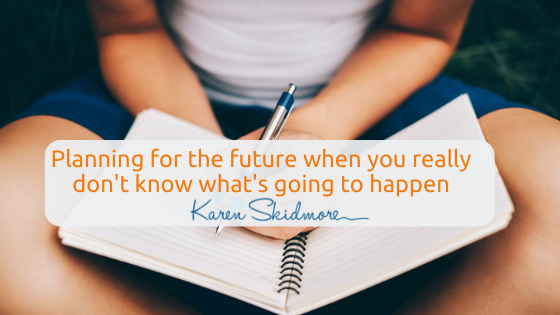
by Karen Skidmore | 05,20 | Business Planning, Stories, inspirations & thoughts for the day
How do you feel about planning for the future right now?
As we work our way through this period of ‘you can go to work if you can go to work, but if you can’t then don’t’, it may feel it’s nigh impossible to plan for the future.
There are so many what-ifs, it can be hard to think about what decisions to make.
What if the schools go back in June? What if they don’t open until September?
What if we can’t run any in-person events until 2021? What if it turns out that we can run one earlier?
What if I can’t get a haircut until July? What if I pretend my webcam is broken until then?
The truth is that, when it comes to business planning, there is very little in our control, even in times before lockdown. We’ve been forced to withdraw to our homes and change the way we live and work. And now we are slowly working out how we emerge from this.
We may not know exactly how life and business are going to operate going forward, but did we really have that much control over what happened before all this happened?
There’s a great quote from Eisenhower that I use in my training sessions.
“I have always found plans to be useless, but planning to be indispensable.”
Because you have so little control over what really goes on inside and outside of your business, the plan you create has to evolve as you implement. And sometimes has to change completely to take into account of external factors such as bad health, a piece of tech that breaks or losing a key member of your team, through to the extremes of pandemics and forced lockdowns. All of which happens out of our control.
We may think we are in control.
But we aren’t really.
Life fluidly moves in and around us, sometimes slow, sometimes fast. It’s rare that anything stays the same for any length of time.
So does this mean we simply leave our business to chance and never plan?
Absolutely not.
I don’t agree with Eisenhower that plans are useless, but I do agree that it is the planning that is indispensable because it forces you to do the thinking needed to grow your business.
Planning forces you to make decisions.
Just think how much mental energy you use when you are feeling indecisive, even about little things such as what to wear and what to have for lunch each day. It can be exhausting!
Planning forces you to be considered; to step up and dig deep into what you stand for and what it is you truly want to accomplish.
Planning forces you to be connected with your current customers, your marketplace and your numbers, which in turn keeps your emotions grounded, particularly in times of uncertainty.
So although many of you may love to create, to be open to opportunities and don’t like being hemmed into targets or strict project management deadlines, don’t let the current uncertainty of our rules and boundaries for how we ‘go back to work’ let you drift from month to month.
Planning can happen, and needs to happen, no matter how much uncertainty we have in our lives.
And I share this with you today because it’s the day our Momentum members will be showing up and doing their 90 Day Plans.
I’m connecting into the energy that I want to deliver for our morning session that will have them coming away with clarity on how to deliver their sales targets and how exactly they are going to implement the projects that will ensure their long term growth.
Making decisions.
Being considered.
Being connected.
That’s what I’m feeling into as I prepare for today’s session and it’s what I believe is important for all of us as we emerge from lockdown together with a plan for a future.
Until next time, do less, be more and play bigger.

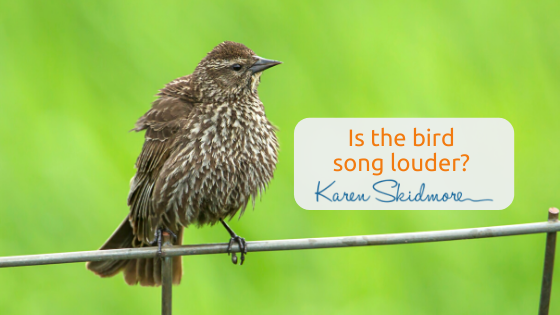
by Karen Skidmore | 04,20 | Stories, inspirations & thoughts for the day
As I write this, it’s the end of the fourth week of lockdown here in the UK. And the question over whether the bird song is louder than previous years is one that I’ve been pondering on for the past few days.
I took a break from my hour exercise today and sat on the grass in a little valley, nestled in the Devil’s Punchbowl. I feel incredibly fortunate to be living just five minutes walk from acres of National Trust land, here on the Surrey/Hampshire borders.
As I closed my eyes, the birds around me were singing.
Are they louder than previous Springtimes?
There’s no doubt that for those of you who live in the cities, that the birds sound louder than ever before. But for me, sitting on that grass, I rarely hear traffic, even on the busiest of days.
I refrain from googling this question now I am back home because my educated guess is that, no, the birds aren’t singing any louder than before. Yes, we have seen some dramatic changes to pollution levels across the globe; from Venice to the banks of the River Ganges. But I doubt that our birds are pumping up the volume because we are all in lockdown.
The reason is more likely to be because I am quieter than usual.
Without the hustle and bustle of trips up to London for meetings, the regular family taxi pick-up from the train station and meet-ups with friends, I find myself, along with the whole nation, with absolutely nowhere to go, except my daily exercise hour and essential grocery shopping.
I find I have the time to sit on my bench in my front driveway to have my morning coffee. I have the time to take my hour exercise every day, walking across acres of heathland and woodland. I find I have more time to spend with myself, despite the fact that there are four other adults in the house with me.
My awareness of outside noise such as the Springtime bird song is simply turned up because I have been more still in one place than for a long time.
Now, what has this to do with business?
Plenty, I promise you.
Because it’s this stillness that allows you to experience your own business. When the emails are closed down, you stop scrolling your newsfeeds and the Zoom calls are finished, this is your opportunity to sit in the stillness.
I get it.
Stillness can feel incredibly difficult for a lot of people; especially for those Dominant Do-ers among us. It wasn’t something that came to me easily, either. As a self-confessed strong, independent woman who has spent the first 40-odd years of life being a person who strives in getting stuff done, I have had to learn how to be still.
I have taken courses, hired coaches and invested a lot of money in helping me settle so I can hear the stillness. Some may say it has been the menopausal awakening that many women experience during the start of their fifth decade. Others may call it a mid-life crisis!
But stillness has become the place I come back to any time I need to make a decision.
Stillness has become the grounding I need before switching tasks or taking on a new project.
Stillness allows me to connect with my True Profit Compass; my version of how I want the energies of money, creativity and impact to show up in my business.
And stillness now is allowing me to hear the bird song.
I’d love to know what you are noticing now you have nowhere to go. What has been amplified around you now you have nowhere to go?
Until next time, do less, be more, play bigger.

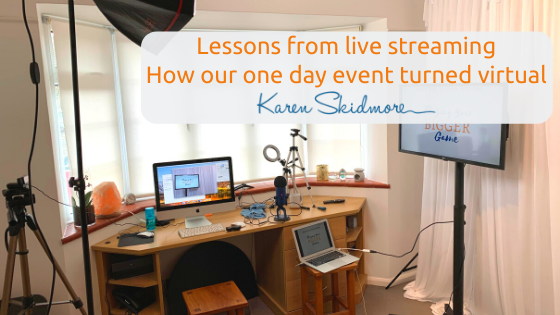
by Karen Skidmore | 04,20 | Stories, inspirations & thoughts for the day
I’ve been running events, in-person and virtual, for sixteen years; ever since I first started up my coaching and training business. My first workshop was in a room above a local hair salon, usually used for training nail technicians.
Back in October 2004, they swept aside the bottles of nail varnish so I could run a very intimate life coaching workshop; one person who’d bought a £25 ticket from a poster I had up in the local village hall, my next-door neighbour and a friend who I pleaded ‘to make up the numbers’.
From there, I got braver and started running half-day marketing workshops, every half term at my local YMCA in Guildford. I ran those for about two years, getting fifteen people in the room who wanted to learn about email marketing, blogging and writing marketing copy. Teleseminars came on to the scene at about the same time, which gave me my first experience of running virtual training. Since then I’m not sure I can count the total number of webinars and virtual training sessions I’ve run over the years; the total probably runs up into the thousands!
But when it came to live streaming my training day, Play Your Bigger Game, I’d always had an excuse to NOT do it.
Play Your Bigger Game became a signature workshop that I’ve run for the past three years to teach small business owners the principles of True Profit Business; how to step up and grow, without burning out in the process. We also run these days to invite those interested in ongoing mentoring and accountability in their business growth journey to join our Momentum programme. With the support of my team, Melina Abbott, Senior Coach, and Alexia Padgham, Customer Support Manager, we have created a slick and efficient process to allow us to run these events effortlessly. I seriously have so much fun running these days and absolutely love the community of high energy people we attract and engage with during the day.
Why would I want to change what works?
Well, that’s exactly what we need to do sometimes to discover how far we can stretch to our fullest potential.
And if there is one huge benefit to our current crisis, it is that we are all being challenged to stretch and adapt to a new way of running our businesses.
As we approached our next Play Your Bigger Event during the threat of lockdown back in March, there was absolutely no way I was going to cancel. There’s a rule I’ve always lived by ever since that first workshop in a nail technician room; never cancel an event, no matter how few tickets you sell.
And ‘not cancelling’ didn’t mean that my event was going to be turned into ‘just another webinar’.
Yes, the content I was delivering could very easily be converted to slides and webinar presentation style. But we knew that it wasn’t just the content that people came for; they came for the engagement, energy and community.
They came to be inspired and to give themselves the space they needed to think bigger.
Once I had decided that we were going to put our full energy into making sure our virtual delivery still had the high energy and impact that many of our clients now expect of us, the challenge was on. I wanted to create my own TV studio at home and set up three different rooms for people to experience; a training room, the main room for group discussion and breakout rooms for smaller group networking and interaction. My photo below will show you the tangle of wires and camera set up that I used to create this on the day.
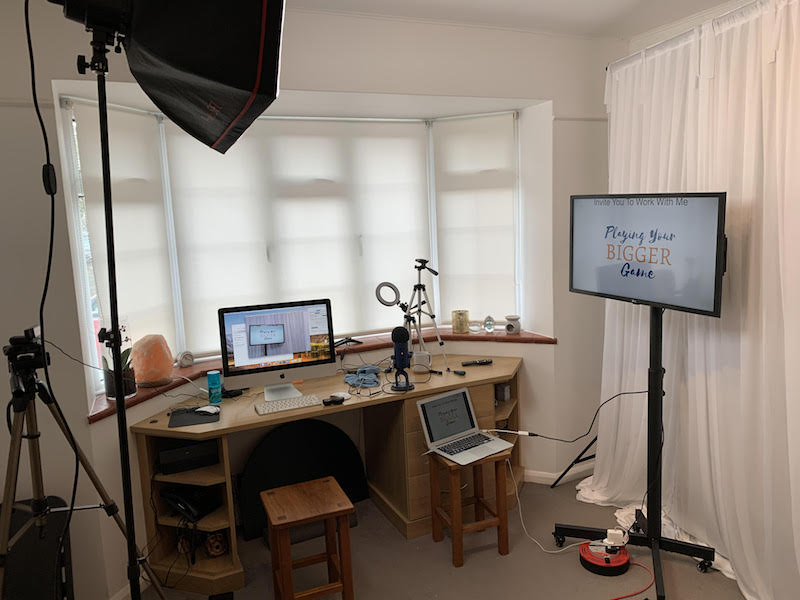
And what I wanted to share with you here today was some of the key lessons I have learnt from the experience to help you stretch your thinking about running live events, too.
1) Be inspired by what’s (im)possible
Call it divine timing, but a few weeks before my own event, One of Many, a women’s leadership training company, had to make the tough decision to move their own annual conference to a virtual experience. With more than 500 tickets sold, myself included, they shifted the whole two-day event online in just 36 hours. This happened a week before lockdown, so many had already travelled to London, some having flown in from different continents.
The One of Many team stepped up beyond belief and delivered an incredible two-day virtual experience. Inspired by what they were able to do on such short notice and such an enormous scale, I realised the potential of live streaming my own event.
2) Plan … but keep agile
The week before we knew we were going into lockdown, I booked a videographer and his team to come to the day. The intention was that we would still be in the room but open up the event to a live stream for anyone not able to travel or need to self-isolate.
A few days later, more and more events were being cancelled. The venue was still happy for us to be there, but because many people were now self-isolating, it looked like it could only be me, my team and the two video guys in the room.
A couple of days later, I made the call to do the event from home. Even though everyone on the team, and many of my ticket holders, was still prepared to travel at this stage, I didn’t want to take any risks.
A couple of days later still, we were in lockdown. The videographers were cancelled, and my team were still happy to run the day but from our home offices in Surrey, Shropshire and Kent. I got onto Amazon and started to order the tech needed to do this myself. One TV stand and photography stand and curtain later, I had got together my spare tripods, webcams and studio lighting; I had created my own TV studio at home.
Could I have planned it out like this? No. Every day our world was changing and new rules were being set. I held on to my vision of what I wanted to create but stayed agile to re-think all our possibilities with each turn of events.
3) Prepare to the nth degree
I knew many people who’d bought tickets to our originally advertised live event would be wondering how an all-day virtual training session will work, especially as many would be having a few more (big and small) people in the house with them on the day.
All-day virtual events aren’t new but I was guessing that for most people who were joining us, this was maybe their first time. It was certainly the first time for us to be delivering one!
So we got busy the week before, working through all the logistics to ensure everyone was prepared for this new and exciting way of learning and engaging. We covered the timings and agenda for the day, including opening up the Zoom room half an hour before we were due to get started to welcome people in, just as Alexia would have done at our usual registration desk at the venue.
We got comfort breaks scheduled so that everyone could move, stretch and refresh their drinks. And we ran a lunchtime networking to give everyone the choice to switch completely off or join a Breakout Session and have a virtual lunch with us.
In our delegate packs, we gave them full instructions on how to use zoom, including how the Breakout rooms were doing to work, and helped everyone communicate with their family members, suggesting they give them the timings of when you are coming out for breaks and explain to them the importance of giving you this space to engage fully. We even gave them a Do Not Disturb – I’m Playing My Bigger Game’ poster to put on their door.
4) Dress for success
We wanted everyone to be comfortable but to think about how they wanted to show up. This wasn’t a vanity exercise. Everyone may have started to enjoy wearing all-day-PJs but our day together was a day to stretch everyone’s business thinking and turn up for the day as the CEO of their business.
What you wear, including how you style your hair and make up your face, will mentally prepare you to play your bigger game. Not only did this make a huge difference to the energy of the day, everyone loved the opportunity to dress up when they hadn’t left the house for more than a food shop or their daily exercise.
5) Have the right team to support you
Technically I could have done this event by myself, but the reality was to ensure the high expectations that I had set, I needed my full team to support me.
Alexia’s eye for detail for pre and post event planning was integral to the success of the day and she amazed me how she quickly adapted our event ‘ops manual’ to cover everything needed to run this on Zoom. During the day, she managed the attendance, helped out with any technical queries and shared the relevant PDFs and links at the right times.
Melina stepped up and ran both the chat and the breakout sessions, which meant I could focus on the content and being the trainer for the day. Making the decision to put her in the driving seat of the Zoom session and making me co-host was definitely the right thing to do.
We had WhatsApp running so we could communicate outside of the Zoom room, as well as planned for emergencies such as power outages or Zoom booting any of us out.
It was only about half-way through the day that I really appreciated the fact that this virtual day was also being managed virtually, by three people across three corners of the UK. The team doesn’t have to be in the same room as you!
6) Go beyond your thinking, and hold that vision
‘An engaging and energy fueled day’ was my vision and I stuck to it. I didn’t want this event to be run as a typical webinar, where you simply watch the slides and send messages in the chatbox. This day started at 9am and ran through to 5pm so even though we were unable to bring everyone together in the same physical space that we normally do at our Play Your Bigger Game events, we put our full energy into making sure our virtual delivery still has the high energy and impact that many of our clients now expect of us.
During the day we invited everyone to join different breakout rooms and work with smaller groups on the various exercises we had planned. Plus we factored in quiet thinking time, as well as open Q&A sessions, to help mix up the day.
How did our event turn out?
To be honest, beyond my wildest expectations. We not only had everyone who bought a physical ticket – bar one – be able to attend the day, we also sold a further four tickets for the virtual event at the full £125+VAT price.
When everyone around me during our last week of promotion was offering free webinars and giving away content, I really did wonder whether it was the right thing to do. But I stuck to my belief that our event was worth it; it was the content and container that created the value, not the food and refreshments that the venue would have provided.
The feedback
We’ve learnt a lot about how to make more time for our Breakout sessions and how to manage the chat better, but here are just some of the comments we got back from those attended:
“Really good. I think the use of the two ‘locations’ worked brilliantly. Of course, there is a lot to be said for meeting people in person but I think you did brilliantly. I started using online meeting technology in 2000 and I’ve rarely experienced a better session. Well done.”
“Surprisingly good, no post-lunch slump. I found my focus didn’t drop during the event and I probably talked to more people than perhaps I would have at a live event, not sure, I’ll have to attend a live event and then feedback on that!”
“I loved it. It meant I could take part without the worry and expense of travelling to the event. I get put off from attending events because of the logistics around my lifestyle, but this was a great way of doing it. Plus, no travelling for hours to get home afterwards either. Or getting up early to get to the venue on time.”
And we made sales.
I was nervous about this part of the day, for sure. Without being in the room with people, there is no opportunity to speak at length during the coffee break or in the bar afterwards. But this didn’t seem to make a difference.
It helps, for sure, having a programme that serves the right level of support that’s needed right now. Momentum is about supporting business owners to play the long game, to plan for the future and put in the systems, processes and team in place to help them grow. However, what we deliver isn’t a low cost membership so even with the four figure price tag, I was delighted that our event worked both as a training day, and a sales day.
We loved this format so much that I am planning another live stream event shortly (details coming out very soon) and it’s certainly made me rethink my event strategy going forward. Although there is no doubt that we will go back to meeting in person at some point, there is absolutely the risk that we will see a ripple effect of shorter lockdowns in the Autumn and next year.
Those businesses who have not cancelled their training events during this period, but postponed them to later this year, may find that if they don’t adapt to a new way of delivery, that they will have to cancel if we go into another lockdown again. And if they are unable to refund tickets because they’ve spent the ticket sales already, it’s going to cost them.
If you run live events and workshops, I’d love to know what you are planning to do. How are you adapting this new world of virtual delivery? And what have you been inspired to change and try out?
Until next time, do less, be more, play bigger.

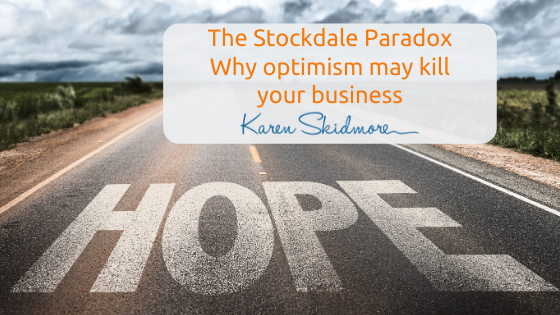
by Karen Skidmore | 03,20 | Stories, inspirations & thoughts for the day
I know that none of us could ever have imagined our current status quo. Some of you are now at home with children, others have now found your previously quiet workspaces occupied by spouses. We all have friends and family who we know are vulnerable, so there’s no doubt you are deeply concerned.
We are all facing some of the most challenging weeks and months ahead.
That said, I believe we have to find ways to keep moving forward and find a new normal in which to operate. Which is why I want to share with you today the story of James Stockdale, former vice presidential candidate, naval officer and longest surviving Vietnam prisoner of war.
Last week I was due to interview a good friend of mine for the next series of my True Profit Business podcast. She is inspirational in so many ways, not least because of her deep connection to intuitive thinking in her business strategy. I’ve known her since she started her business from her converted garage 14 years ago and have admired her balance of commitment and grace as she led her team to build one of the biggest brands in family holidays.
Decimated by the past six weeks, the day we were due to speak was following some of the toughest days yet. We both decided that now was not the time to do this interview. We spoke on the phone instead. Her story is not mine to share but suffice to say I was sobbing during the call. And for several hours after.
What I can share with you today is her introduction to me of the Stockdale Paradox.
His story is not an easy one to read. I’ve only skimmed the top; his seven years of torture and endurance contain many horrific incidents. However, it is his strategy of his survival that I have taken inspiration from and feel it’s so relevant to what we all are facing right now.
Author Jim Collins summarises Stockdale’s story in his book, “Good to Great”:
The name refers to Admiral Jim Stockdale, who was the highest-ranking United States military office in the “Hanoi Hilton” prisoner-of-war camp during the height of the Vietnam War. Tortured over twenty times during his eight-year imprisonment from 1965 to 1973, Stockdale lived out the war without any prisoner’s rights, no set release date, and no certainty as to whether he would even survive to see his family again. He shouldered the burden of command, doing everything he could to create conditions that would increase the number of prisoners who would survive unbroken while fighting an internal war against his captors and their attempts to use the prisoners for propaganda.
At one point, he beat himself with a stool and cut himself with a razor, deliberately disfiguring himself, so that he could not be put on videotape as an example of a “well-treated prisoner.” He exchanged secret intelligence information with his wife through their letters, knowing that discovery would mean more torture and perhaps death. He instituted rules that would help people to deal with torture (no one can resist torture indefinitely, so he created a step-wise system–-after x minutes, you can say certain things–-that gave the men milestones to survive toward). He instituted an elaborate internal communications system to reduce the sense of isolation that their captors tried to create, which used a five-by-five matrix of tap codes for alpha characters. (Tap-tap equals the letter a, tap-pause-tap-tap equals the letter b, tap-tap-pause-tap equals the letter f, and so forth, for twenty-five letters, c doubling in fork.) At one point, during an imposed silence, the prisoners mopped and swept the central yard using the code, swish-swashing out “We love you” to Stockdale, on the third anniversary of his being shot down. After his release, Stockdale became the first three-star officer in the history of the navy to wear both aviator wings and the Congressional Medal of Honor.
How on earth did he deal with it when he was actually there and did not know the end of the story?”
“I never lost faith in the end of the story,” he said when I asked him. “I never doubted not only that I would get out, but also that I would prevail in the end and turn the experience into the defining event of my life, which in retrospect, I would not trade.”
Finally, I asked, “Who didn’t make it out?”
“Oh, that’s easy,” he said. “The optimists.”
“The optimists? I don’t understand,” I said, now completely confused given what he’d said earlier.
“The optimists. Oh, they were the ones who said, ‘We’re going to be out by Christmas.’ And Christmas would come, and Christmas would go. Then they’d say, ‘We’re going to be out by Easter.’ And Easter would come, and Easter would go. And then Thanksgiving, and then it would be Christmas again. And they died of a broken heart. This is a very important lesson. You must never confuse faith that you will prevail in the end–-which you can never afford to lose–-with the discipline to confront the most brutal facts of your current reality, whatever they might be.”
What I’ve taken from this story is the danger of blind hope and optimism.
We don’t know when all this ‘will end’. It’s not ‘business as usual’ and we will never go ‘back to normal’; what we are experiencing right now and in the coming weeks and months will be felt for years from now.
But this is not the time to be falling into fear and pessimism. Several of my Momentum members have been reporting over the weekend of requests for work still coming in. Hurrah! But there’s no doubt many of you are, and will be, experiencing a drop in revenue over the coming weeks and months because of projects postponed and client work cancelled.
Fear is percolating from all angles but this is not a time for panic. We only have to look at the impact panic buying has had our food supply chain to know that a scarcity mindset is NOT helpful.
If you are like almost all my clients that I work with, you are running a low-cost business that sells your expertise, talents or skills in some form or other. You may have a small team, but you probably aren’t one of the many thousands of businesses who will have to take advantage of the Government’s funding and assistance in the coming months.
You are self-employed, freelancing or running a service-based business from home or virtual offices, and even if you take advantage of the promised tax holidays, you will still have to pay your tax at some point; they are simply giving us grace periods to help manage our immediate situation.
However, this doesn’t mean we fall into the trap of pessimism and scarcity thinking. Money needs to flow so cancelling everything, hunkering down and restricting yourself to a diet of lentils is not helpful for a business like yours.
But go too high on the optimism scale and optimism will kill your business. If you live in the hope that everything will be OK in a few weeks, it will leave you with your head in the sand and unprepared for going the distance.
No matter what is going on for you right now, I believe that this is a time for holding your vision, with a healthy dose of pragmatism on the side.
So get a grip of your finances. Get really clear on what your monthly outgoings are, know when your next annual subs are due, such as business insurance, (because surprises hurt your cash flow!), and look at your household budget; this is the time to clean up your expenditures and to change up, rather than slash, your marketing spend.
Take time to pause and re-think your approach to how you can serve your clients and customers. Tearing up your business plans and knee-jerk into taking action on ideas could end up distracting you or end up with an unsustainable ‘cheap’ offer that exhausts you.
Prepare for the worst so you have the resilience to not only carry on but also be financially able to keep holding your vision and see where you can pivot and evolve your business offers.
As James Stockdale never lost faith that he would eventually leave captivity, so must we have faith that we can and will get through this.
Your business will evolve.
You will learn many new skills over the coming months.
You will have days of feeling helpless and lost.
You will have days of inspired action and an immense sense of gratitude and appreciation.
You won’t be alone. You will need to ask for help and support.
You will find yourself needing to be creative, daring and bold with your decisions.
You will need to dig deep into your vision and the difference you so want to make through your business.
And you will need to be agile and light on your toes to keep yourself available to the opportunities that do present themselves to you.
This is not a time for optimism and blind hope.
This is a time for vision and leadership.
Until next time, do less, be more and play bigger.

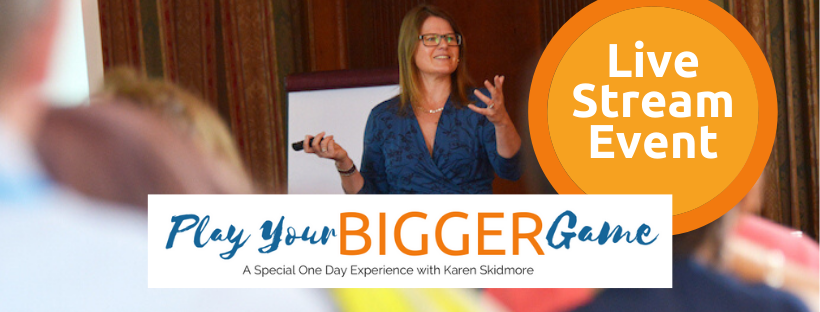
Thursday 2nd April 9.30am to 5pm UK Time
If you are looking for help moving forward and know you have to evolve your business, then take a look at our event on Thursday, 2nd April. We are live streaming our previously advertised in-person workshop and have re-designed the content to give you the four important steps we all have to take over the coming months: Pause, Pivot, Plan and a fourth session on People. It’s critical that we ALL reach out and ask for help, in business AND life, particularly now as we all seem to working with many more small and big people in our homes right now!
www.KarenSkidmore.com/biggergame


